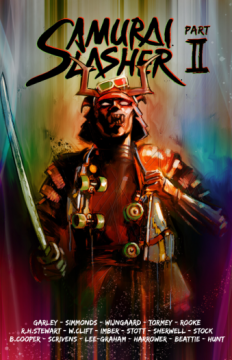Brexit and the cost to the UK small press community
 We don’t normally get involved in politics, but with recent events in the UK reaching far beyond the polling booths and the palace of Westminster, we sent our intrepid reporter Olly MacNamee to look at the impact that a Vote to Leave The EU, has had on the UK Comic Community. He talks to comic creators and comic con organisers to find out the true impact that Brexit is having on the world of small press comics.
We don’t normally get involved in politics, but with recent events in the UK reaching far beyond the polling booths and the palace of Westminster, we sent our intrepid reporter Olly MacNamee to look at the impact that a Vote to Leave The EU, has had on the UK Comic Community. He talks to comic creators and comic con organisers to find out the true impact that Brexit is having on the world of small press comics.
What started off as a desperate attempt by David Cameron to claw back votes from UKIP (and in doing so save his own bacon at last year’s general elections – there’s a joke there somewhere), the idea of a referendum on the EU has now resulted in the catastrophe that is Brexit. The fallout seems to have been immediate for many of those in the UK, but what does this mean for small press and indie comic creators?
On the whole indie comic creators, tend to make comics in between full time jobs outside of the comics’ community, but are passionate enough to get their titles out there, whether through crowdfunding routes or out of their own pocket. Even if you are a bigger indie publisher in the UK today (e.g. Tpub), you’re still not going to have the limitless resources of DC or Marvel, now are you? Margins are already pretty slim, if they exist at all, and I think most people will be happy to break even. Certainly, no-one can expect any more hand-outs by the EU, that’s for sure. If there were any to be had in the first place that is.

Printing costs will rise, if they haven’t done so already, whether you’re printing here or abroad. Sam Webster (Joe Cape) makes an interesting point about the whole production process from pencils to inks to printing. “A lot of the raw materials used in the creation of a comic could very well be coming in from abroad already and so, whether from the EU or further afield, costs will rise in ways that are far too complicated to get into here and now. Let’s just say, it’s all about tariffs and all agree to nod collectively and sagely.”
We’ve seen it before: when costs go up, the customer will bear the brunt of these before the company producing the product. It all adds up. I’ve seen the price of petrol start creeping up already and it won’t be long before we are being told the price of grain and other essentials will have to go up, just like they did at the start of the recession back in 2008. I can’t remember prices going down, can you? Not everything that goes up comes down and the myth that was trickle down economics has really been shown up for the fraudulent claim that it was. You only need to take the current case of billionaire and infamous tax-dodger Phillip Green and his Machiavellian squeezing of BHS to the sum of £571 million to see the reality of this nonsense economic theory. While 11,000 people lost their jobs, and 20,000 people their pensions, good old Phil took receipt of his £100 million super yacht this week. Happy holidays, Phil. I hope your crew forgot to pack the life preservers at least.
But, if the creators raise their prices, they could find themselves pricing themselves out of the market as fans, with less and less money to spend on their hobby, start rethinking their pull lists and any additional titles on top of these. I’m doing exactly that this summer. I was already going to use the DC Rebirth as an excuse to revise my spending, and that was before Diamond had no other choice but to raise their prices. Not everyone is fortunate enough to have their own Nostalgia and Comics (Birmingham) who have very publicly let all its customers know that they ain’t raising prices. Like DC, they’re holding the line. But, for how long will they be able to do this? Neil Sambrook (Fly Comics) says he has even considered cutting back on page counts to keep his prices at the same price point. it’s only what DC did to help tow the line at $2.99, dropping form 25 pages to 22, and saving the punters a dollar in return. It worked, so why not use this game business model in the small press arena too?

Other downsides? The Arts, under the Tories, have always been historically underfunded. No-one I spoke to can see this getting any better. Certainly, even before the Brexit debacle, the Tories have made it their mission to phase out the Arts from the curriculum, and succeeding too if my school is a snapshot of what is happening nationally. This is a sentiment shared by others too, just incase I was coming off as a reactionary Socialist (I’m not, I’m a pro-active Socialist, but don’t tell the government), Joe Krawec, a newly minted comic book creator of the semi-autobiographical tale, Blood, agreed with me and stated that, ‘all those cross European partnerships for Arts projects and funding – gone. Collaboration – gone. And that isn’t scare-mongering.’
I only need to look at the Cumberbatches and Hiddlestons of this world, and their own privileged backgrounds, to realise that The Arts has, on the whole, always been for the elite. Without funding, we could lose those opportunities that such funding can bring about. Certainly, for a comic-con to be a comic-con in the UK today, I believe Arts Council and EU funding, is essential. One organiser, Shane Chebsey (ICE, Shrewsbury International Comic Art Festival), told me that the cost of flying international guests over have just gone up, as the pound continues to get sand kicked in its face by the more muscular Euro and Dollar. When you consider that spread across a number of guests, how can that be sustained? Cut back on guests, maybe? Meaning, cutting back on quality, which is the bottom line here if we are talking about cutting back as one option. Cutting back on pages, on guests, on quality? Many comics on the indie scene are already black and white, so they couldn’t even consider ditching colour as an option. How cheap would that look anyway, if your favourite indie comic suddenly went from full colour to black and white?
Are there any upsides? Well, yes. If you are trying to sell your comics to an American readership, well you’re comics just got cheaper, and hopefully, more desirable as a result. And, in this global village of ours setting up your stall, so to speak, and promoting it via social media is more time consuming that costly. For those publishers who have a fixed page rate, the opportunity to work on a UK small press comic has just got more appealing, don’t forget, as Steve Tanner (Time Bomb Comics) and others have let me know. It’s Tanner who also points, optimistically, to the hope that foreign fans may very well take a punt on a UK indie title, that can often offer a bigger page count when compared to mainstream publishers, or simply be more appealing as their US comics soar up in price, like a bird, or a plane. Mike Garley (Samurai Slasher) has taken a novel approach to support smaller comic book stores by offering 5 issue of Samurai Slasher for free! That’s a win-win situation, surely?

And, there’s always crowdfunding, right? At this time of writing, the daily statistics published by Kickstarter would suggest only a 51.25% success rate, albeit comics as a category does better than most, but it’s still pretty much a 50/50 split. That’s a lot of unsuccessful campaigns and, one imagines, 50% less crowdfunded comic book titles out there too. The count for unsuccessful comics is 3,820! 4,094 were successful, however.
Of course, these are raw, cold, hard fact and can be interpreted in many different ways when on drills down to look at it more qualitatively. For example, out of those 3,820 failed campaigns, how many were any good? The problem, one can suppose confidently, is that Kickstarter can be something of a vanity project, Hell, your project might even be funded by friends and family only and unleashed into a market that simply doesn’t want it.
But, us comic book readers can be a resilient bunch. Or stubbornly habitual at least. On average, the comic book readers of the world tend to be an educated bunch and therefore, possibly have more money in their back pockets? Maybe, just maybe, there is an argument for digital distribution to finally take root as a means to cut back even further on the print and distribution costs? But then, most indie titles can already be purchased electronically either through big online distributors like Comixology or as pdf copies and the like through creators’ own sites. Whichever way you look at it, the thought of Brexit creating a situation on which more and more small press creators are squeezed out of the market, or don’t even bother in the first place, is a far worse world that the current one; a small press industry where diversity thrives and even challenge the spandex and cape crowds. Maybe, Stuart Mulrain (True Believers Comic Con) sums it up best when he told me that, ‘the comic book community is a great and truly supportive community to be in (which is why we love being a part of it so much), so as the Brexit fallout levels out, things will get back to some kind of normality, but until that happens, it’s up to the community to come together and keep the industry thriving.’
Rising prices all round, a weakened pound, less comic content, less comics even; it’s never has it been a better time to go out there and support your local comic book creators. Ask at your LCBS too and see what indie titles they currently have in? If they haven’t got the one you’re looking for, ask ‘em to get it in. Every sale is one sale more that tells the creators that what they’re doing is worth it. The small press scene in the UK today is thriving with diverse, distance voices. Long may that be the case.


October 9, 2025 @ 12:40 am
You’ve got a new fan here! Tune into pakistani tv ptv sports live — studio analysis and highlights. fast, reliable HD streaming. post‑match shows, replays. low‑latency playback.
February 6, 2026 @ 6:33 am
atlanta office space for rent [url=https://otvetnow.ru]https://otvetnow.ru[/url] best management seminars
February 6, 2026 @ 10:03 pm
http://www.dir.ca.gov [url=https://otvetnow.ru]https://otvetnow.ru[/url] inverse mortgage
February 7, 2026 @ 7:34 am
https://askoff.ru
February 8, 2026 @ 5:07 pm
https://askoff.ru
February 12, 2026 @ 6:08 am
https://zfcejfyxiv.wordpress.com